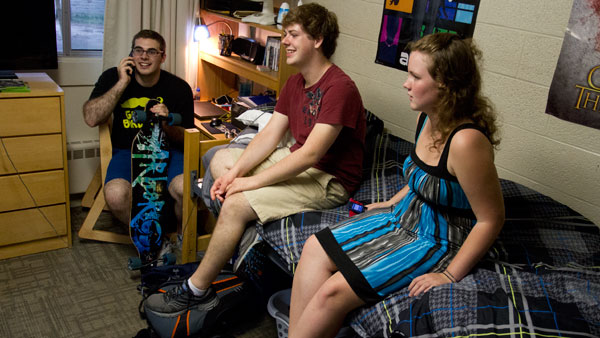Cornell University has introduced a gender-inclusive housing option that gives undergraduates the opportunity to live with a person of the opposite gender.
The policy, which was implemented in Spring 2013, allows rising sophomores, juniors and seniors to opt for gender-inclusive housing if they are applying to live in a program house, language house, the university co-op or on West Campus. First-year buildings and women-only buildings are not involved in the policy.
Cornell’s Student Assembly passed a resolution to adopt a gender-inclusive housing policy in October 2012. The goal was to allow students to have the option of living with whomever they felt most comfortable with, the assembly said.
Carlos Gonzalez, Cornell’s assistant director of residential services, said 90 students showed interest in gender-inclusive housing for the 2013-14 academic year, but only 26 students ultimately chose to live in gender-inclusive rooms and suites.
Students in a room or suite have to specifically opt for gender-inclusive accommodation, Gonzalez said in an email interview. He also said bathrooms depend on the building and personal preference.
“Suite bathrooms would be co-ed, and common bathrooms are dependent on the building,” he said. “Some buildings have bathrooms exclusive to males and females. Some properties have a mix of male, female and co-ed bathrooms.”
Currently, Ithaca College does not have plans to introduce a gender-inclusive housing policy. However, mixed gender housing is available to students in non-traditional housing, such as the college apartments, and off campus, Bonnie Prunty, director of the Office of Residential Life, said.
Under the college’s current housing policy, only LGBT students can live in mixed-gender residential housing. Prunty said there is a special housing process for transgender students.
The college implemented a transgender housing policy in the fall of 2004. Incoming and current transgender students are required to fill out a form on Residential Life’s Web page for housing selection and discuss their ideal housing situation with Luca Maurer, director of the Center for Lesbian, Gay, Bisexual, Transgender Education, Outreach and Services.
Maurer said the LGBT center and Residential Life at the college came together with the administration to make a plan for transgender students.
“For each individual student, their needs are different, and our transgender housing process on campus honors the fact that a cookie-cutter approach is not going to meet the needs of all students,” Maurer said.
Maurer said he was surprised Cornell’s new policy has gained so much attention, because Ithaca College has had a similar housing process, albeit only for transgender students, for about a decade.
“It says they’ve specifically adopted this for genderqueer, gender nonconforming and transgender students,” Maurer said. “My first thought was, ‘We have that already.’ People access that using a transgender housing request. Cornell’s policy was limited. It’s not all of their buildings, it’s some of them, and ours is not limited in any way.”
Previously, the college attempted to conduct a pilot program of gender-inclusive housing, but each year the program didn’t garner enough students willing to live on the specific floor, Prunty said.
“We had picked a location in the quads that we were going to offer as gender-neutral housing,” Prunty said. “We needed a certain number of returning students to be willing to select that as a housing option, knowing that fewer new students would probably be comfortable in that arrangement. We have new students who don’t even want to live in coed-by-door housing.”
During the first attempt at the gender-neutral floor, two students signed up to live on the floor, and only one student signed up the following year, Prunty said. She said there weren’t enough returning students in traditional housing looking for that type of arrangement.
Senior Isabel Galupo said she believes a gender-neutral housing policy isn’t necessary, because students currently have mixed-gender options in on-campus apartments. The college’s previous attempts to push the policy into dorms became a non-issue, she said.
“Trans and genderqueer students felt safe and comfortable enough to not need a designated “safe space” — which is awesome,” she said.
If a gender-inclusive floor was eventually launched, Prunty said, she thinks RAs at the college would only need additional training to deal with partner conflict, if romantic couples ever took part.
“RAs may need a little more training on how to work with those kinds of housing situations and conflicts,” Prunty said.
Meanwhile, Prunty said a gender-inclusive policy at the college is always a possibility in the future, but Residential Life would reconsider the policy only if students were interested in it.
“Maybe students today would have more interest in that arrangement than they have in the past,” Prunty said. “We would only move in that direction if we were hearing from students that that was a housing arrangement that they were looking for, and we just haven’t been hearing that.”








